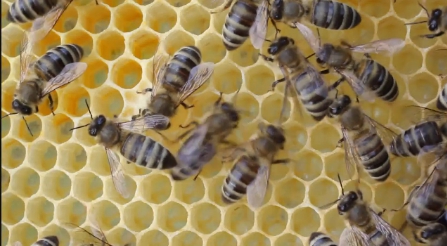
Features
Crop Protection
Inputs
Latest research on protecting bees, pollinators
March 30, 2015 By AmericanHort
 Screen capture image taken from "Protecting Bees & Pollinators: What Horticulture Needs to Know." HORTICULTURAL RESEARCH INSTITUTE
Screen capture image taken from "Protecting Bees & Pollinators: What Horticulture Needs to Know." HORTICULTURAL RESEARCH INSTITUTEMarch 30, 2015, Washington, DC and Columbus, OH – The Horticultural Research Institute, in collaboration with AmericanHort, Society of American Florists, and the American Floral Endowment, have created an educational video that provides information on the horticultural industry’s essential role in bee and pollinator stewardship.
“Protecting Bees & Pollinators: What Horticulture Needs to Know” narrates the current state of bee and pollinator health, provides information on factors that impact pollinators and the environment including the use of pesticides, and underscores the beneficial role horticulture plays in providing healthy and nurturing pollinator ecosystems.
The video serves as a valuable resource to industry professionals and horticulture enthusiasts by providing an overview of all the factors affecting bee and pollinator health today.
“Very few businesses can be more beneficial to bees and pollinators in this country than horticulture,” says John Coulter, president of the Horticultural Research Institute. “Our passion is to grow healthy plants and flowers. Our products offer the very thing pollinators need to thrive: diverse and ample sources of forage.”
Michael V. Geary, president and CEO of AmericanHort, agrees.
“We know that horticulture provides essential food sources for pollinator populations. And we also know that some consumers are concerned about pesticide use. To help us answer the tough questions posed by gardeners and consumers, we’ve gathered top minds in conservation, research, and pest management to educate and inform us on this issue. We are also funding and leveraging research on best practices for our members.”
Featured on the video are experts in the fields of conservation, pollinator research, and integrated pest management, including:
• Vicki Wojcik, Ph.D., research director, Pollinator Partnership. Wojcik oversees pollinator research for the Pollinator Partnership, an independent organization committed to the protection of native pollinators vital to ecosystems and agriculture. Augmenting pollinator habitat and forage is a driving goal for Dr. Wojcik and the Pollinator Partnership.
• Richard Cowles, Ph.D., entomologist, Connecticut Valley Laboratory. Cowles is a leading entomologist and researcher with more than 25 years of expertise in the areas of biology, integrated pest management, and pest research. Using plants commonly found in the landscape, he is researching systemic insecticide uptake and potential pollinator interactions with nectar and pollen. In turn, this knowledge will further the establishment of best management guidelines for growing plants and protecting pollinators.
• Andrew Bishop, Ph.D., managing director, Green Leaf Plants. Bishop is an international recognized expert in all facets of greenhouse plant production and pest management. He currently is a managing director for Green Leaf Plants in Lancaster, Pennsylvania; providing starter plants to growers in ornamental horticulture, serving global markets from facilities in the U.S. and British Columbia.
• Zac Browning, Owner, Browning’s Honey Co., Inc. Browning is a fourth generation commercial beekeeper and honey producer operating over 20,000 hives for honey production and pollination in multiple states. He has served the beekeeping industry in many ways including as trustee for the Foundation for the Preservation of Honey Bees, board member of the National Pollinator Defense Fund, and is a past president of the American Beekeeping Federation.
The video was produced as part of the Horticultural Industry’s Bee & Pollinator Stewardship Initiative. In 2014, the Horticultural Research Institute, in collaboration with AmericanHort, SAF, and the American Floral Endowment, established this initiative with three primary goals:
• Convene a task force to develop a bee and pollinator stewardship program, including creation of best management practices for plant production.
• Identify and fund research that will help answer key science questions and fill gaps needed to design and refine the stewardship program.
• Collaborate with other groups interested in augmenting pollinator habitat and protection.
To watch the “Protecting Bees & Pollinators: What Horticulture Needs to Know” video, go to: http://americanhort.org/AmericanHort/Membership/Private/protect_bees.aspx.
For more information on the Horticultural Industry’s Bee & Pollinator Stewardship Initiative, visit: http://americanhort.org/AmericanHort/Knowledge_Center/hri_pollinator_research.aspx.
Print this page